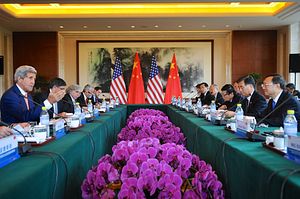The sixth session of the annual U.S.-China Strategic and Economic Dialogue wrapped up in Beijing today. U.S. Secretary of State John Kerry and Chinese State Councilor Yang Jiechi headed the strategic track, while Treasury Secretary Jack Lew and Chinese Vice Premier Wang Yang handled the economic track. With tensions running high between the two countries, participating officials mostly stuck to their talking points on heated issues like the South China Sea maritime disputes and military relations. Obviously, these issues will remain high-profile sources of tension in the near future. However, some interesting tidbits from the official comments reveal three other points of friction worth keeping an eye on.
First, the U.S. apparently pushed back hard on recent Chinese comments criticizing the alliance system in the Asia-Pacific. A senior State Department official expressed U.S. concern with speeches, including Xi Jinping’s remarks at CICA, that “sound very much like the old ‘Asia for the Asians’ concept.” According to the official, Kerry “explained very forcefully that the U.S. remains deeply committed to our alliance system.”
The official said the U.S. and China were engaged in an “ongoing discussion… about the regional architecture,” including how best to combine existing institutions with new ones (including CICA, which China aims to elevate into a regional security platform). However, the official also warned that China’s vision for Asia-Pacific security “is not built on the framework that has provided security and stability to the region for the last six-plus decades.” Ultimately, the U.S. continues to see its alliances as a stabilizing force for the region, while China believes the opposite. These competing visions for the Asia-Pacific security architecture bear watching over the coming years.
Second, China and the U.S. have also agreed to strengthen cooperation on counter-terrorism, as Yang Jiechi noted in the concluding press conference for the S&ED. There were no details immediately available as to how, exactly, the two countries would expand their cooperation. China has been placing an increasing focus on combating terrorism; given the United States’ continuing commitment to counterterror activities, this area is ripe for cooperation.
However, differences between the U.S. and China were also immediately apparent. According to the State Department, Kerry emphasized the humans rights aspect of counterterrorism, highlighting “the linkage” the U.S. sees “between human rights and counterterrorism efforts.” The State Department even brought in Sarah Sewall, Under Secretary for Civilian Security, Democracy, and Human Rights, to talk with China about “the drivers and the motivations that often lead to radicalization.” Kerry also urged the Chinese to distinguish between terrorist activities and legitimate political dissent — Uyghur rights groups say that counterterrorism is often used as an excuse to crack down on political activism.
This was likely a very uncomfortable conversation; China angrily refutes the notion that its policies towards Uyghurs are contributing to the recent surge in terrorism. In response to U.S. suggestions that China could do better, Beijing has slammed Washington for having a “double standard” on terrorism. The strong link in State Department remarks between counterterrorism and human rights is guaranteed to irk China, suggesting that we shouldn’t expect much in the way of practical cooperation on counterterrorism anytime soon.
Finally, the U.S. and China discussed the ever-thorny question of cyber-espionage. According to Reuters, the talks were “frank” — which is usually diplomatic code-speak for “heated.” The official U.S.-China cyber working group discussions remain suspended; China cancelled the group earlier this year to protest the U.S. indictment of PLA officers for cyber espionage. According to the State Department, Kerry “made the case” for restarting the talks. But when the official was asked if China had agreed to do so, the answer was a terse “No.”
In the press conference, Yang Jiechi said that “China hopes the U.S. side can create the conditions to carry out U.S.-China dialogue and cooperation on the Internet,” implying that Beijing continues to wait for the U.S. to drop the case against the PLA officers. The State Department briefing made it clear, however, that it has no intention in interfering with Department of Justice’s legal case. The impasse remains, leaving little hope for progress on cyber issues.

































